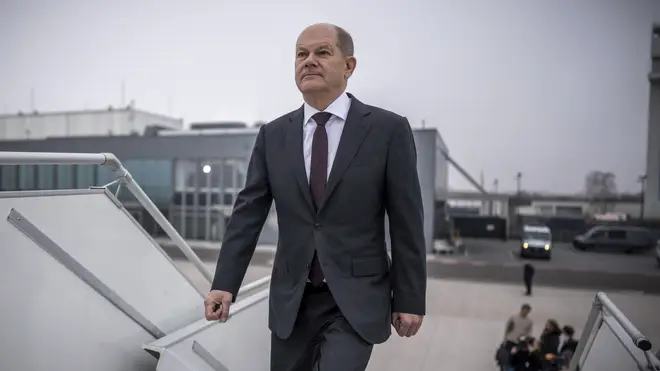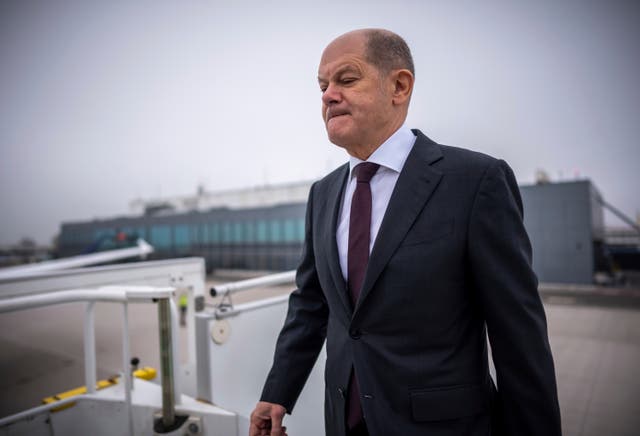
Henry Riley 7pm - 10pm
8 February 2024, 16:34

Olaf Scholz will meet members of the Congress later on Thursday along with President Joe Biden to push for further US and European aid.
German chancellor Olaf Scholz pushed for further US and European aid for Ukraine as he set off on a visit to Washington, declaring it was time to send Russian President Vladimir Putin a “very clear signal” that the West won’t let up on supporting Kyiv.
Mr Scholz will meet members of the Congress later on Thursday along with President Joe Biden on Friday.
His visit comes after wartime aid for Ukraine was left hanging in the Senate as Republicans blocked a bipartisan border package that had been tied to the funding, then struggled to coalesce around a plan to salvage the aid for Kyiv.

Mr Scholz did not mention that directly in a statement to reporters before his departure, and took no questions.
But he said a key issue now is “how Europe, but also the United States, can perpetuate support for Ukraine”.
“What has been pledged so far in Europe and what has been pledged by decisions of the American Congress isn’t yet enough,” he said.
“So we must achieve a way for all of us together to do more.”
Germany is stepping up aid for Ukraine this year, planning more than 7 billion euros (£5.9 billion) for weapons deliveries despite a domestic budget crisis.
It has delivered air-defence systems, tanks and armoured personnel carriers among other aid since Russia’s full-scale invasion started and is now Kyiv’s second-biggest supplier, after the US.
Leaders of the European Union, of which Germany is the most populous member, last week sealed a deal to provide Ukraine with 50 billion euros (£42.6 billion) in support for its economy.
Berlin is making “a very big contribution, but it won’t be enough on its own if sufficient support doesn’t come together everywhere”, Mr Scholz said.
“Now is the moment for us to do what is necessary — give Ukraine the possibility to defend itself, and at the same time send the Russian president a very clear signal: the signal that he can’t expect our support to ease off.”
The message in the coming weeks needs to be that Western support “will last long enough and be big enough”, the chancellor added.
Mr Scholz already called recently for other European countries to step up with more weapons deliveries for Ukraine, saying that “it can’t be down to Germany alone”.
The German leader said in mid-December that if the situation in Ukraine worsens, other countries reduce their aid or the threat to Germany and Europe increases, “we will have to react to that” with a possible further increase in aid, and his government could seek an exemption from the country’s strict self-imposed borrowing limits.
But officials have stressed that the priorities are for all in Europe to step up and for the US to continue its aid.
In an opinion piece published in the Wall Street Journal ahead of his US trip, Mr Scholz wrote that “we must continue to move in a strategic lockstep on both sides of the Atlantic”.
Putin “is trying to undermine our unity and turn our citizens against supporting Ukraine,” and others are watching to see whether those divisions can be exploited and “whether disinformation campaigns can take hold”, he added.
“We must prove them wrong by convincing citizens on both sides of the Atlantic that a Russian victory would make the world a far more dangerous place.”